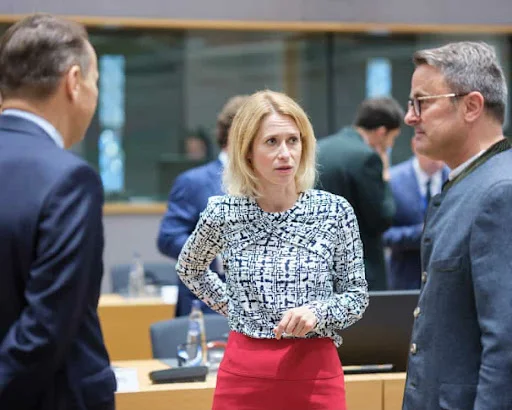By Ephraim Agbo
Slovakia, Malta, and the Power of Saying “No” When Europe Needs a United “Yes”
Let’s not sugarcoat it: The European Union just tripped over itself—again.
On Tuesday, what was supposed to be a decisive moment in Brussels ended in yet another embarrassing stalemate. The EU foreign ministers met to approve their 18th package of sanctions against Russia—a sweeping new attempt to starve the Kremlin’s war machine. Instead, the whole deal collapsed.
Why?
Because Slovakia and Malta said “no.”
Two of the EU’s smallest member states—with a combined population of less than 6 million—managed to halt a sanctions deal affecting over 440 million Europeans.
And whether you call it diplomatic leverage or moral cowardice, it’s shaking the foundation of Europe’s foreign policy.
🎯 What Was in the Sanctions Package?
This wasn’t just another list of blacklisted oligarchs. The 18th sanctions package was ambitious—and potentially painful for Moscow:
- A full ban on Russian natural gas by 2028
- A floating oil price cap, set at 15% below market average (~$47/barrel)
- Sanctions targeting Russia’s arms industry, banks, and surveillance tech
- Measures to crack down on front companies helping Russia evade earlier sanctions
In short: a bold step to shut off the tap—both literally and financially.
But bold doesn’t mean bulletproof.
🇸🇰 Slovakia: When the Small Say No to the Strong
Slovakia’s Prime Minister Robert Fico didn’t just block the sanctions—he mocked them.
“It is an imbecile proposal,” he told reporters, referring specifically to the planned 2028 gas ban.
Fico’s outrage isn’t random. Slovakia gets nearly 60% of its gas from Russia and has a contract with Gazprom valid until 2034. He warned that banning Russian gas would:
- Breach long-term contracts
- Cause price spikes across Slovakia’s already fragile energy market
- Spark legal fights that Brussels won’t help resolve
And here’s the kicker: He’s not entirely wrong.
Slovakia’s economy is deeply integrated with Russian energy. While Germany and France have the financial muscle to pivot to LNG and renewables, Slovakia doesn’t. Fico turned that vulnerability into a weapon.
🇲🇹 Malta: Silent Veto, Loud Impact
Malta didn’t offer the theatrics Slovakia did—but its quiet refusal to back the package was just as deadly.
Malta’s concerns reportedly stem from the impact on its shipping and energy trade, particularly the bunkering of marine fuel, some of which is suspected to be Russian oil in disguise. The island nation has also come under scrutiny for reflagging vessels helping Moscow bypass maritime bans.
Translation: The business of war has loopholes, and Malta might be one of them.
⚠️ Let’s Talk Hypocrisy: Who’s Still Buying from Russia?
Here’s the uncomfortable truth: while the EU loudly sanctions Russia, several of its own members are still buying from Moscow. Let’s name them.
🇪🇺 European Countries Still Importing Russian Energy (as of 2025):
| Country | Imports from Russia | Details |
|---|---|---|
| Slovakia | Gas | Contract with Gazprom until 2034 |
| Hungary | Oil, Gas | Receives via Druzhba pipeline |
| Austria | Gas | Gets 50–55% of gas from Russia |
| Bulgaria | Gas, Nuclear Fuel | Still reliant on Russian fuel for reactors |
| Germany | LNG (indirectly) | Imports Russian LNG via third-party ports |
| Malta | Marine fuel (indirect) | Suspected involvement in re-exporting oil |
| Czech Republic | Gas, Oil | Transitioning, but still receiving Russian energy |
Despite nearly two years of war and billions in aid to Ukraine, Russia earned over $130 billion from fossil fuel exports in 2024 alone—and a non-trivial chunk came from Europe.
🧠 So, What’s Really Going On?
Let’s call it what it is: The EU is trying to wear two hats at once. It wants to lead the charge against Russia—but not all member states are willing to sacrifice comfort for principle.
Brussels wants to punish Putin? Fine.
But not if it means blackouts in Bratislava or profit loss in Valletta.
And countries like Slovakia are done pretending that solidarity doesn’t come with a bill.
Fico is leveraging his veto to protect his own economy. Whether you view that as patriotic pragmatism or political blackmail depends on which side of the pipeline you're standing on.
🔧 Brussels' Weak Response
The EU Commission scrambled to offer Slovakia compromises:
- A proposed “emergency brake” on the gas phase-out
- Financial assistance for alternative infrastructure
- Legal shields for breaking Gazprom contracts
But Fico wasn't biting.
He knows something Brussels doesn’t want to admit: In a union of 27, even one outlier can derail the mission. And until that changes, the EU will continue playing Whac-A-Mole with its own members every time a sanctions package is proposed.
💬 Final Thoughts: United in Words, Divided by Gas
Slovakia and Malta’s veto isn’t just a procedural hiccup—it’s a warning flare.
It shows how energy insecurity, domestic politics, and economic self-interest continue to undercut Europe’s strategic ambitions. The question isn’t just "What will the EU do next?" It’s:
How long can Europe afford this illusion of unity?
Until the EU reforms how foreign policy is decided—or faces up to its internal contradictions—Russia will keep exploiting the cracks, and Ukraine will keep counting the cost.
🔻 TL;DR (Too Long; Don’t Retreat)
- The EU’s 18th Russia sanctions package collapsed due to vetoes from Slovakia and Malta.
- Slovakia’s PM Fico called the gas ban “imbecile” and refuses to risk energy stability.
- Malta’s quiet resistance is linked to possible indirect trade in Russian oil.
- Several EU countries still import Russian energy, weakening the moral power of sanctions.
- Until Europe resolves this internal divide, its response to Russia will remain as fragmented as ever.












No comments:
Post a Comment